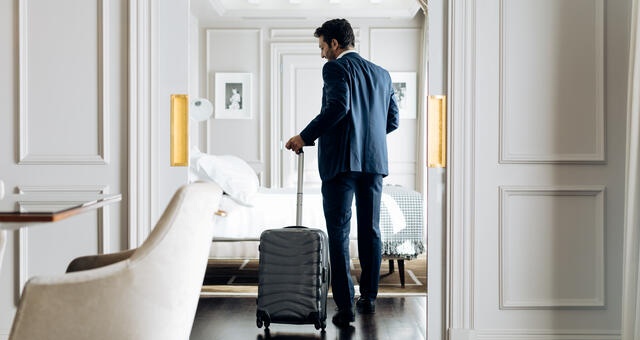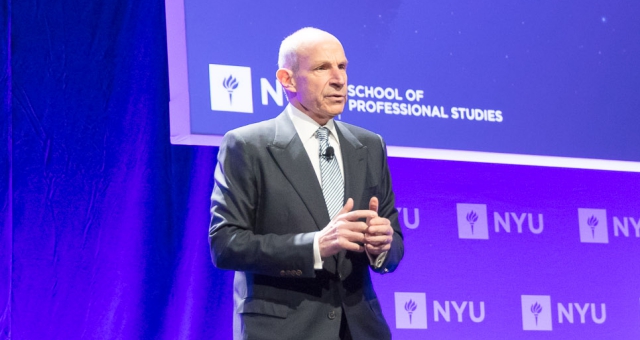Loews Hotels, Chairman and CEO, Jonathan Tisch, has called upon industry leaders to position travel as both an economic driver and an essential component of a healthy, functioning society in a post-pandemic world at this week’s 44th Annual NYU International Hospitality Industry Investment Conference in New York.
“If the past two years have proven anything, it’s that travel is not discretionary: it’s essential,” said Tisch, who is also Chairman of the NYU Conference, Tisch, who is also Co-Chairman of the Board of Loews Corporation.
“It brings people together, broadens perspectives, and spurs innovation and progress. It’s the antidote to isolation and tribalism. And at a time of turning in, locking down, and scaling back, it’s more urgently needed than ever.
“Travel is essential to the way we work and live, because it has tremendous potential to connect us, to each other, to ideas, and to opportunity.
“And while travel isn’t a panacea, it can make a big difference in boosting compassion and understanding – virtues that, today, are in such short supply,” he said.
Tisch said one the keys to continued success of the industry’s rebound will be business travel.

“Of course, travel doesn’t just connect people to each other. It also connects people to ideas—and fosters innovation and invention,” he said.
“And our success in bringing business travel back will depend on our ability to prove it.
“This isn’t the first time experts have predicted the imminent demise of our industry. Many of us remember the panic that set in after 9/11, and after the Great Recession and, if you can believe it, after teleconferencing first came on the scene.
“Back then, we used to say, ’you can’t fax a handshake’.
“And even though now we’re a little more cautious about shaking hands, and fax machines are relics… the core of that argument still rings true.
“During the pandemic, when sales meetings, conferences, and retreats went virtual, it didn’t take long to realize the creative spark isn’t the same through a screen.
“Zoom fatigue is such a common topic, we’re now fatigued by Zoom fatigue.

“Being together is simply better for collaboration, productivity, and morale.
“One study found that 90% of employees view travel as a perk of their job. Another found that in-person pairs produced more creative ideas than virtual pairs.
“And as business leaders who prioritize culture and community ourselves, we’ve all experienced the palpable energy in the room during company offsites and retreats.
“Employers across industries and sectors understand this and have begun to call employees back to the office. Yet many are still struggling to figure out the mix of hybrid schedules, community-building, and deep work that will keep people productive and engaged.
“So buried in this challenge, we have an opportunity. The travel and tourism industry doesn’t have to represent a return to business-as-usual.
“We can offer a proactive vision of how to move forward.
“And that starts with acknowledging that the lines between work, travel, and leisure have permanently blurred.

“Workers who don’t have an office or a water cooler anymore can find one in Miami, or Philadelphia, or Asheville.
“They don’t need to use vacation time to explore a new city—they can work while they play.
The same goes for traditional business travelers. With hybrid schedules and generous work-from-home policies, there’s no reason to rush home just because your meeting is over.
“And office groups seeking to strengthen their culture – after years of remote onboarding and solo brainstorming, and at a time when ping pong tables and free lunches aren’t enough to retain the best and the brightest – can come together for team-building 2.0.
“Meanwhile, we can’t overlook the opportunity right in our own backyards.
“As we all know, there are a lot of challenges inherent to remote work—from sustaining focus… to setting boundaries… to dealing with unstable internet connections.

“So, people are increasingly looking to nearby hotels for a change of scenery, a refuge from distraction, and premium WiFi while they’re on the clock.
“And that presents a unique chance for us as an industry to reimagine our offerings. To make them attractive to every kind of business traveler, whether it’s the local who comes to us to work for one day, or the digital nomad who comes to us to work for weeks on end. How do we design our rooms and public spaces to accommodate today’s guests?
“Many companies have taken advantage of this new paradigm and thought expansively about the possibilities ahead. But as an industry, we need to keep making our case. We need to remind people what it’s like to network at conferences like this one… or talk to clients in person…or exchange ideas at morning spin class… or check emails poolside.
“And we need to keep reimagining the future of work, with travel and tourism at the center of it,” Tisch said.

